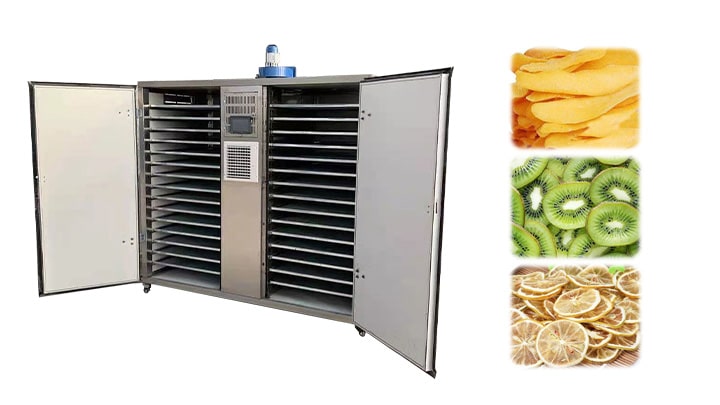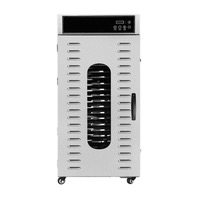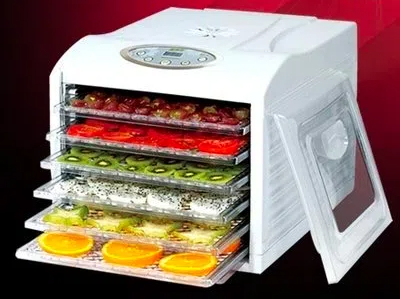
Content Menu
● Introduction
● The Rise of Fruit Dryer Machines in Sri Lanka
● Types of Fruit Dryer Machines Available in Sri Lanka
● Features of Modern Fruit Dryer Machines
● Benefits of Using Fruit Dryer Machines in Sri Lanka
● Popular Fruits for Drying in Sri Lanka
● The Market for Dried Fruits in Sri Lanka
● Challenges and Considerations
● Future Prospects
● Conclusion
● Frequently Asked Questions
>> 1. Q: What is the average cost of a fruit dryer machine in Sri Lanka?
>> 2. Q: How long does it take to dry fruits using a fruit dryer machine?
>> 3. Q: Are there any government initiatives supporting the adoption of fruit dryer machines in Sri Lanka?
>> 4. Q: Can fruit dryer machines be used for other foods besides fruits?
>> 5. Q: How do dried fruits produced by machines compare to sun-dried fruits in terms of quality and nutrition?
Introduction
Sri Lanka, known for its lush tropical climate and abundant fruit production, has been experiencing a growing interest in fruit dryer machines. These innovative devices are transforming the way fruits are preserved and processed, opening up new opportunities for farmers, entrepreneurs, and food enthusiasts across the island nation. In this comprehensive guide, we'll explore the world of fruit dryer machines in Sri Lanka, their impact on the local industry, and the benefits they bring to both producers and consumers.
The Rise of Fruit Dryer Machines in Sri Lanka
In recent years, Sri Lanka has witnessed a surge in the adoption of fruit dryer machines, also known as food dehydrators. This trend is driven by several factors:
1. Preservation of Seasonal Fruits: Sri Lanka's tropical climate yields a wide variety of fruits throughout the year. Fruit dryer machines allow for the preservation of these seasonal fruits, extending their shelf life and availability.
2. Value Addition: By transforming fresh fruits into dried products, farmers and processors can add value to their produce, potentially increasing their income.
3. Export Opportunities: Dried fruits have a longer shelf life and are easier to transport, opening up new export markets for Sri Lankan producers.
4. Health Consciousness: With the growing awareness of healthy snacking options, dried fruits have gained popularity among health-conscious consumers.

Types of Fruit Dryer Machines Available in Sri Lanka
Sri Lanka offers a range of fruit dryer machines to cater to different needs and scales of operation:
1. Household Dehydrators: These compact machines are perfect for home use or small-scale production. They typically feature 5-8 trays and are suitable for drying small batches of fruits.
2. Commercial Dehydrators: Larger in capacity, these machines are designed for small to medium-sized businesses. They often have 10-32 trays and offer more advanced features like temperature control and timer settings.
3. Industrial Dryers: For large-scale operations, industrial fruit dryers can process significant quantities of fruits. These machines are often custom-built to meet specific production requirements.
Features of Modern Fruit Dryer Machines
Today's fruit dryer machines in Sri Lanka come equipped with various features to ensure efficient and high-quality drying:
1. Adjustable Temperature Control: This allows users to set the optimal drying temperature for different types of fruits.
2. Digital Timers: Precise timing ensures that fruits are dried to perfection without over-drying.
3. Even Heat Distribution: Advanced airflow systems ensure that heat is distributed evenly across all trays.
4. Multiple Trays: Most machines offer multiple trays, allowing for the simultaneous drying of different fruits or large quantities of the same fruit.
5. Energy Efficiency: Many modern dryers are designed to be energy-efficient, reducing operational costs.
Benefits of Using Fruit Dryer Machines in Sri Lanka
The adoption of fruit dryer machines brings numerous benefits to the Sri Lankan food processing industry:
1. Reduced Food Waste: By extending the shelf life of fruits, these machines help reduce food waste, a significant issue in tropical climates.
2. Year-round Availability: Dried fruits can be stored for extended periods, ensuring availability even when fresh fruits are out of season.
3. Income Generation: Small-scale farmers and entrepreneurs can create value-added products, potentially increasing their income.
4. Export Potential: Dried fruits are easier to export, opening up new markets for Sri Lankan produce.
5. Nutritional Preservation: When done correctly, fruit drying preserves much of the nutritional value of fresh fruits.

Popular Fruits for Drying in Sri Lanka
Sri Lanka's diverse fruit production offers many options for drying:
1. Mango: Dried mango slices are a popular snack both locally and internationally.
2. Pineapple: Dried pineapple rings retain their tropical flavor and are rich in fiber.
3. Banana: Banana chips are a staple snack in Sri Lanka and have export potential.
4. Jackfruit: Dried jackfruit is gaining popularity as a healthy snack option.
5. Papaya: Dried papaya is rich in nutrients and has a unique flavor profile.
The Market for Dried Fruits in Sri Lanka
The market for dried fruits in Sri Lanka is growing, driven by both domestic consumption and export opportunities. Local supermarkets and health food stores are increasingly stocking dried fruit products, while there's also a growing demand for Sri Lankan dried fruits in international markets.
Challenges and Considerations
While fruit dryer machines offer many benefits, there are some challenges to consider:
1. Initial Investment: Quality fruit dryer machines can be a significant investment, especially for small-scale producers.
2. Energy Costs: Operating these machines requires electricity, which can impact operational costs.
3. Quality Control: Maintaining consistent quality across batches can be challenging and requires proper training.
4. Market Competition: As more producers enter the market, competition may increase, potentially affecting prices.
Future Prospects
The future looks bright for fruit dryer machines in Sri Lanka. With ongoing technological advancements, we can expect to see more efficient and cost-effective machines entering the market. Additionally, as awareness of the benefits of dried fruits grows, both domestically and internationally, the demand for these products is likely to increase.
Conclusion
Fruit dryer machines are revolutionizing the food processing industry in Sri Lanka, offering new opportunities for value addition and income generation. As the technology continues to evolve and become more accessible, we can expect to see a wider adoption of these machines across the country, contributing to the growth of Sri Lanka's agricultural and food processing sectors.

Frequently Asked Questions
1. Q: What is the average cost of a fruit dryer machine in Sri Lanka?
A: The cost of fruit dryer machines in Sri Lanka varies widely depending on the size and features. Small household models can start from around LKR 15,000, while commercial-grade machines can cost upwards of LKR 100,000.
2. Q: How long does it take to dry fruits using a fruit dryer machine?
A: The drying time varies depending on the fruit type and desired level of dryness. On average, it can take anywhere from 6 to 24 hours to fully dry fruits.
3. Q: Are there any government initiatives supporting the adoption of fruit dryer machines in Sri Lanka?
A: While specific initiatives may vary, the Sri Lankan government generally supports agricultural modernization. It's best to check with local agricultural offices for current programs or subsidies related to fruit drying technology.
4. Q: Can fruit dryer machines be used for other foods besides fruits?
A: Yes, most fruit dryer machines can also be used to dry vegetables, herbs, and even make jerky, making them versatile tools for food preservation.
5. Q: How do dried fruits produced by machines compare to sun-dried fruits in terms of quality and nutrition?
A: Machine-dried fruits often retain more nutrients and have a more consistent quality compared to sun-dried fruits. They are also less prone to contamination and can be produced year-round, regardless of weather conditions.












